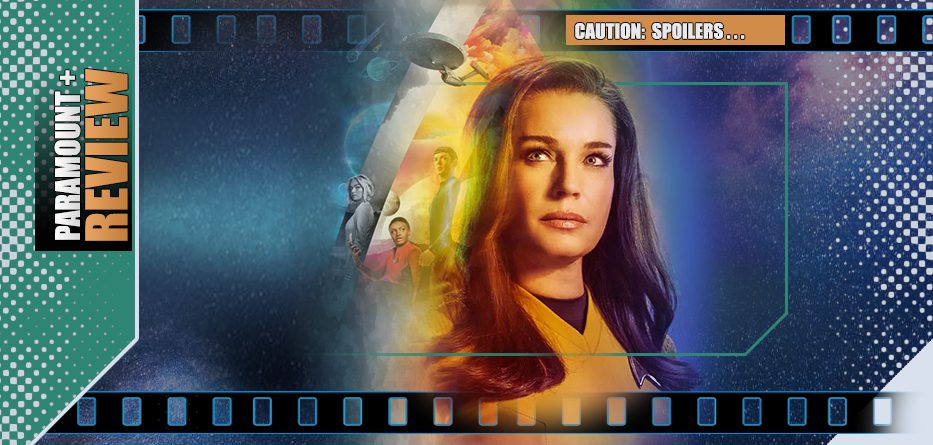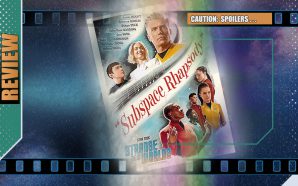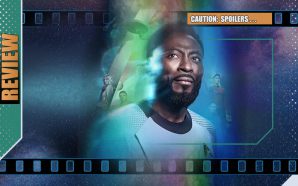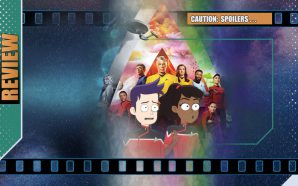The heritage of Una Chin-Reilly (aka ‘Number One’) has been uncovered. Coming from a race of Illyrians whose genetic-augmentation was outlawed under Federation protocols (as a result of Khan and the Eugenic Wars), she hid her early life but the consequences of that personal and legal deception on her application for Star Fleet have now caught up with her. Given her admirable record, she’s given the option of a dishonourable discharge and freedom if she accepts the terms but will never again be able to serve in uniform or rank.
One of her oldest allies Captain Pike pre-emptively reaches out to one of Una’s estranged friends, Neera Ketoul, a respected Illyrian lawyer who has no love for the Federation itself, risking his own career – and maybe life – to make her take the case. But if Una doesn’t take the existing deal she runs the risk of decades in prison and a charge of sedition.
Whatever the outcome or original intent, there seems to be no legal way to excuse Una’s actions, but as recriminations swirl and a by-the-book verdict demanded, one should never underestimate the determination of friends and enemies alike…
*spoilers*
While one might argue, if it pleases the court, that some of Star Trek‘s most memorable episodes have been in exploring those strange new worlds, boldly saving whole planets and flirting with their occupants, it’s also true to say that some of the best have carried the weight of genuine moral quandaries and, of those, several have been of the courtroom variety: Spock defending Christopher Pike in TOS‘s The Menagerie and the clever reuse of material from the unaired pilot, The Cage; an overzealous Jean Simmons creating a ‘Drumhead‘ against the crew and Data’s existence and independence questioned by those who wanted him to be taken apart in The Next Generation episodes and several instances aboard Deep Space Nine and Voyager. So here we have the latest example, Ad Astra Per Aspera, the second episode of Strange New Worlds‘ second season and while it might not seem the obvious story to fit so early into a season-pacing timeline (more talk and walk than cosmic trekking), it’s a sedately-paced, yet storming entry that does its fellow legal legacies proud.
While the courtroom comments about pride, prejudice, acceptance, persecution and being afraid of how others seek to label a person might seem on the nose and (sadly) all too timely (take whatever contemporary analogy you want) there’s also a solid, strong and rather clever story at its heart. This is an episode that even metatextually comments on how the usual motivational speech by Pike would not be appropriate to save the day (also wryly covering Anson Mount’s availability for paternity leave) and yet gives us a tour-de-force as guest-star Yetide Badaki’s Neera executes not only an impassioned defense but also a deceptively smart one. Yes, one can argue that we know that Rebecca Romijn is going to survive the day’s trials and tribulations, but it’s interesting to see how that’s achieved and the various conflicting motivations in play. In the end, the inevitable key summation and courtroom maneuver is not one that conveniently negates the law under which Una’s being prosecuted (as many shows might have tried to emotionally hand-wave through) but a savvy deconstruction that demands logical parity. It both reinforces the need for there to be the laws to follow and also for singular, individual reason why they must reflect nuance and change over time. In short, the story is good but the seemingly-impossible defense (and the map to its denouement that is used) is legitimately clever.
While it might not seem the obvious story to fit so early into a season-pacing timeline (more talk and walk than cosmic trekking), it’s a sedately-paced, yet storming entry that does its fellow legal legacies proud….
Though the key scenes rely on Badaki’s shoulders, it’s not quite the two-hander into which some courtroom dramas pivot. There’s key support from the ensemble of characters, some in mere reaction shots and others in testimony and observations. Christina Chong gives La’an Noonien-Singh a series of conflicting emotions – understanding more than anyone the complexities of augmentation and its legacy, fearing it might be her own actions that alerted Star Fleet to Una’s situation and then fiercely defending her on the stand. (When asked “Would it be fair to say that you would not have joined Starfleet if not for Commander Chin-Reilly?” she notes “Counselor, I wouldn’t be ALIVE if it weren’t for Una…“) Babs Olusanmokun and Melissa Navia have fun in a dining hall scene as they watch Ethan Peck as Spock not/interact with the trial’s prosecutor, Pasalk, and there’s even a Gilbert and Sullivan mention later.
Smartly, it’s also worth noting that the design work picks up elements from the past, with returning guest-star Melanie Scrofano (late of Wynonna Earp) and her character Captain batel wearing the same legal emblems on her uniform as Captain Kirk did before (after?).
Yes, fine, you can say it’s all more Sorkin’s bully pulpit than Roddenberry’s already-won idealism – though it underlines Roddenberry’s dream of overcoming differences as much as the sad realisation that we still have a long way to go. But as an episode, it once again underlines the fact that Strange New Worlds continues to have a well-earned confidence, it’s literally going boldly and offering escapism and entertainment while still being as vital as it is nostalgic… especially with the shock news that the popular Star Trek: Prodigy, aimed at younger audiences has suddenly been shelved, likely as a tax write-off.
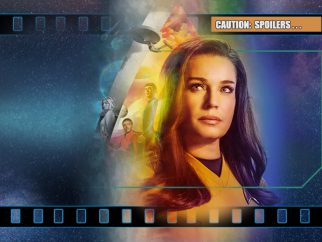
- Story9
- Acting9
- Direction9
- Production Design / VFX8

